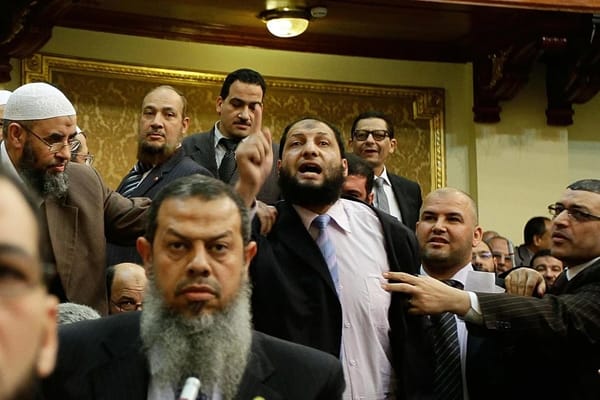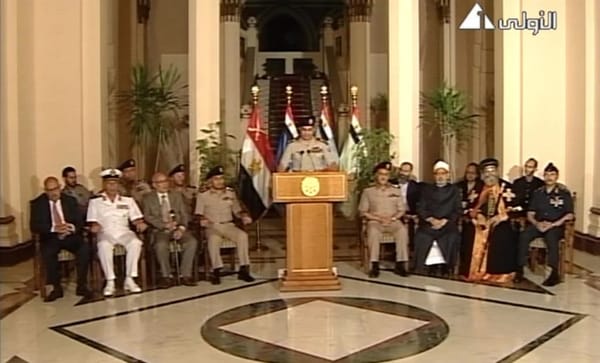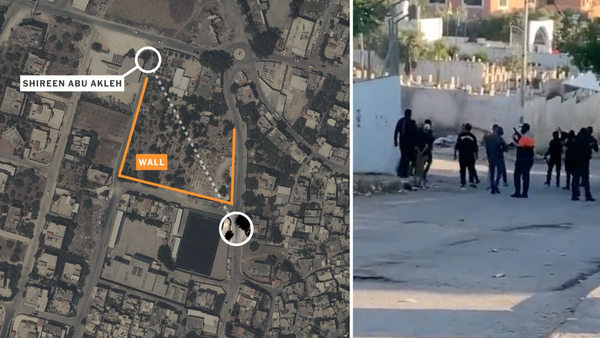Coalitions for collective action, moral panics and perfect victims
Plus renewed war with Houthis, closing Alhurra and a roundup from the weekend

A lot happened on issues related to the Middle East and higher education over the weekend. In today’s post, I want to highlight three of them — one continuing from Friday’s post about the Trump administration’s unprecedented moves against Columbia, and then two others: the US renewal of its bombing campaign against the Houthis, and the Trump administration’s EO shutting down American Arabic-language (among other) international broadcasting. Keep an eye out tomorrow for a post with some fascinating and important new findings related to many of these issues.
(One) Mahmoud Khalil and Columbia: The Saga Continues. As horrible as the details emerging are about Mahmoud Khalil’s detention, it has been somewhat heartening to see a broad-based coalition emerge against the shocking detention and disappearance of Mahmoud Khalil by ICE agents on the Columbia campus (and the broader issues involved with state pressure on Columbia). A wide range of people who disagree on the merits of last spring’s protests against Israel’s war in Gaza can agree on the illegitimacy and dangers of the US government moving to deport a legal permanent resident with a green card not because he has been charged with any crime or even alleged to have violated any laws, but because the Secretary of State has determined that his presence in the United States was contrary to American interests. Many of them now recognize, in ways that have not historically been the case (as Wadie Said notes here) that an assault which begins with Palestinians won’t end there (if only because the Trump administration has been so cartoonishly evil brazenly clear about what it’s doing and hitting so many different targets along the way). Higher education and civil society as a whole needs to build on this recognition to stop falling for strategies of division and distraction, and instead build the broadest possible coalitions and a coherent strategy to push back.
The Trump administration is gambling that the antisemitism wedge will prevent such cooperation and coalitions, and gain support for the unacceptable. By starting with Palestinians and building on last year’s bipartisan moral panic surrounding protests against genocide in Gaza, they are cynically acting to pre-empt coalition building among its common targets. They may well be right that university leaderships traumatized by the last year and terrrified of financial catastrophe will be willing to go along with the most outrageous demands on their internal operations, faculty independence and student rights rather than defend protestors. That surrender is facilitated by the past year’s relentless framing (see Rayan Fakhoury in LRB) by the media, Congress, and advocacy groups of the protestors as antisemitic and pro-Hamas which has made such allegations seem commonsensical and not even needing evidence (see Nadia Abu el-Haj in NYRB on how moral panic paved the path to Khalil’s arrest). Trump certainly seems to be right about the feckless Senate Minority Leader Chuck Schumer, who instead of immediately and forcefully criticizing an obvious overstep by Trump chose to agree that Columbia had been too permissive of protestors and that Khalil should be deported if he was proven to have broken the law (even Trump doesn’t say he broke the law).
But that suppine posture hopefully ends there. Schumer is clearly badly out of step with the prevailing mood across the left and much of the center, even forced to postpone his tour for his new book on antisemitism due out tomorrow which presumably advances similar arguments. Most people get that this time the crackdown won’t stop with Palestinians and won’t stop with Columbia, that all forms of protest against this government are at risk, and that the time to stand together and stand up to Trump’s systematic dismantling of the state, higher education, civil society, and the vision of a diverse and inclusive society is now.
They’d better. The campaign of state repression seems likely to get worse — so many stories have been filtering out already, of Brown University professor of medicine Rasha Alawieh being held at Logan Airport on return from Lebanon despite holding a valid visa, of Columbia Fulbright student Ranjani Srinivasan’s student visa being revoked and fleeing to Canada, of noncitizen students and faculty going silent for fear of deportation, Betar USA, an extreme right wing pro-Israeli group, has claimed credit for identifying Khalil to the federal authorities — and claims that it has already identified thousands more as targets for deportation. Trump has already said that there would be many more arrests to come. The ten universities being investigated by the DOJ and sixty campuses on the Department of Education list are already teed up for the Columbia treatment, and it won’t stop with them.
The defense against this ferocious assault has to be based in a broad defense of collective interests and civil and human rights. Trying to fight individual battles — defending the character of one target of deportation, defending the actions of one university while throwing others to the wolves— is almost certainly going to fail. In the wake of Khalil’s arbitrary and unjust disappearance, a number of well-meaning colleagues and friends have stepped forward to offer character witnesses against accusation that he was antisemitic or pro-Hamas. It’s difficult to not be impressed by the portrait they paint of Khalil as a dedicated activist motivated by an ethos of tolerance and coexistence and an advocate of a two state solution. As Jonathan Ben-Menachem testified in a blog post, “Mahmoud is one of the most upstanding people I have ever met. Alongside other Jewish student activists, I only ever felt Mahmoud’s respect, solidarity, and strength. As Mahmoud told CNN last spring, “I believe that the liberation of the Palestinian people and the Jewish people are intertwined and go hand-by-hand, and you cannot achieve one without the other.””
That’s strong stuff, a welcome corrective to the campaign of insinuation against him, and brave in the current environment. But as I read those testimonials, I couldn’t help but reflect on Mohammed el-Kurd’s recent short book Perfect Victims — a raw, angry, and certain to be controversial examination of the traps which face Palestinians as they try to advocate for their own survival and demonstrate their own humanity. El-Kurd focuses on the systematic dehumanization of Palestinians, a dehumanization that “situated us — ejected us, even — outside of the human condition.” Palestinians present in the public sphere, he argues, must fit within the false dichotomy of “victims or terrorists.” In order to merit sympathy, he argues, the Palestinian victim must be perfect — apolitical, nonviolent, bereaved, and willing to attest to sympathy for Jews and understanding of Zionism despite having suffered unfathomable loss. As he acidly notes, “We are not human, automatically, by virtue of being human — we are to be humanized by virtue of our proximity to innocence.”
And that’s the problem with individual defense. Mahmoud Khalil should not have to be perfect to enjoy full human and civil rights, to be able to exercise constitutionally protected rights to free speech and nonviolent protest, to not be targeted by a repressive state agency for arrest and deportation on amorphous grounds. He should be seen as fully human, with all of the universal human rights which follow, and be accorded all the civil rights which come for anyone else from a valid visa and permanent residence in the United States. His case must be placed in a narrative which includes all the other deported and denied people targeted by Trump rather than hived off within a Palestine exception. Khalil, like everyone, should have those rights even if he didn’t have perfect politics, a perfect story of suffering, a perfect willingness to forgive and forget, a perfect ability to linguistically and politically navigate the demands of respectability in the current political environment.
And trying to meet that standard is a losing proposition. Getting bogged down in the microdetails of a particular case is a well-rehearsed method for ensuring that the bigger picture gets lost. Each time one of these stories emerges, we immediately see an online search break out for evidence that the targeted person tweeted or retweeted or said or maybe thought something which crossed the ever-moving line which makes them deserve what they got. There will always be a tweet to be taken out of context, a statement to be subjected to tortured hermeneutics, or even a completely legitimate political view to be slandered as out of bounds. As we’ve seen in hundreds of cases across many campuses over the last year, in this media and political ecosystem it’s always going to be easier to insinuate guilt than to prove innocence.
To be continued.
(Two) The U.S. renewed its bombing campaign against the Houthis in Yemen, demanding an end to attacks on shipping which have effectively shut down Red Sea shipping over Israel’s war on Gaza. The attacks, which began on Saturday, continued today. The bombing campaign seems unlikely to have a significant effect on the Houthis, who survived and thrived during years of US-backed Saudi bombing and blockade. For some recent scholarship on the Houthis and conflict, see Andrea Carboni, “The Houthi Movement and the Management of Instability in Wartime Yemen,” in the journal Civil Wars, which argues that “a mix of institutional engineering and violence contributed to consolidation of the Houthi regime, allowing the movement to control the wartime instability derived from the volatile nature of national and local alliances.” Veteran Yemen scholar Helen Lackner published a useful and thought-provoking short piece a few months ago in Middle East Report about the evolution of Houthi governance. For an evaluation of US policy options towards the Houthi blockade which had caused “the number of ships transiting the Red Sea and the Suez Canal to the Mediterranean Sea has dropped, by one count, by up to 90%” from late last year, see Thomas Juneau’s short article in Survival.
(Three) A Trump EO shut down American Arabic-language broadcasting. Despite uncertain authority to legally do so (just as with the Woodrow Wilson Center and USIP and the Department of Education and on and on), Trump closed the Voice of America and terminated contracts with its affiliated public media across the globe, including with the Middle East Broadcasting Network, which ran the Arabic-language Alhurra TV and Radio Sawa (Iran International, with unclear but presumably Gulf funding, apparently is unaffected). Alhurra and Radio Sawa were creatures of the post-9/11 Bush administration’s “war of ideas”, an effort to compete with Al-Jazeera by standing up more “objective” (i.e. pro-American) news and opinion. Especially in the early years, I criticized Alhurra and MEBN for exaggerating its audience and reach, which outside of Iraq was pretty minimal, and its credibility, which was tarnished by association with the United States (see Jihad Fakhreddine from last year on some of these ongoing issues). Alhurra had already been undergoing reorganization last fall after budget cuts and internal problems; there seems to be some uncertainty as to whether and when it will actually lose its (Congressional mandated) funding or stop broadcasting. For all the problems with Alhurra, shuttering those stations now, alongside the devastating cuts to USAID and foreign assistance, has to be seen as part of a full-spectrum policy of ending even the effort of building “soft power” support for the United States in the region.
I’ll be back tomorrow with more.
Abu Aardvark's MENA Academy is a reader-supported publication. To receive new posts and support my work, consider becoming a free or paid subscriber.



